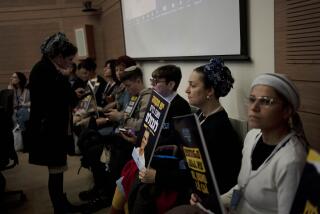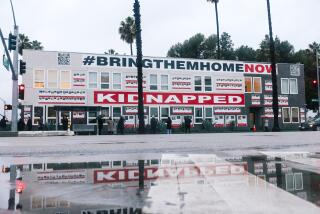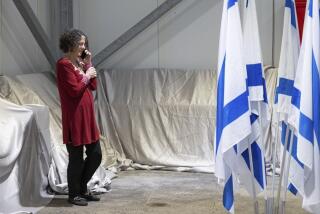Lebanon Hostages Accuse France of Forsaking Them
- Share via
BEIRUT — Three French hostages said in a videotaped appeal Monday that they believe their government has abandoned them to a slow death and that they cannot survive captivity much longer.
Islamic Jihad (Holy War), the fundamentalist Shia Muslim group that claims to hold the Frenchmen and at least three Americans, said it will free them if Kuwait releases 17 prisoners convicted of bombing the U.S. and French embassies there in 1983.
The Islamic Jihad statement did not mention the American captives, but the group made the same demand in the past in exchange for their freedom.
Delivered in Beirut
Copies of the 20-minute videotape and the typewritten statement in Arabic from Islamic Jihad were delivered to offices of Western news agencies in Muslim West Beirut.
Hostage Jean-Paul Kauffmann, a journalist, appealed for diplomacy by Premier Jacques Chirac’s government similar to tactics that the U.S. government used to gain the release of American journalist Nicholas Daniloff from the Soviet Union.
The other hostages on the tape were diplomats Marcel Fontaine, 45, and Marcel Carton, 62. All three were kidnaped last year.
In Paris, the French External Relations Ministry said only that the videotape and texts of the hostages’ statements are being studied.
In a radio interview, Jean-Bernard Raimond, minister for external relations, said officials are talking “with all those who appear to us to be interlocutors who might exercise an influence on those who are holding the Frenchmen. . . .”
Similar Plea
In a similar videotape from Islamic Jihad last Friday, two American hostages asked the Reagan Administration to work as hard for their freedom as it did for Daniloff’s.
That appeal was made by Terry A. Anderson, 38, chief Middle East correspondent for the Associated Press, and David P. Jacobsen, 55, director of the American University hospital in West Beirut. Both were kidnaped last year.
Daniloff, charged with espionage, was released in a deal under which Gennady F. Zakharov, a Soviet U.N. employee also charged with spying, was returned to Moscow and Soviet dissident Yuri Orlov and his wife were allowed to emigrate to the United States.
In its statement Monday, Islamic Jihad said: “We still are waiting for a serious move by the French government toward the release of the 17 strugglers in Kuwait.”
Kuwait has refused to free any of the 17 prisoners.
In their videotape, Kauffmann, Fontaine and Carton said their government has abandoned them.
“It’s long, very long. I cannot take it any more,” said Fontaine, a vice consul at the French Embassy who was kidnaped on March 22, 1985, the same day that gunmen seized protocol officer Carton.
‘Desperate, Tired’
Addressing his wife, Fontaine said: “I am desperate, tired and about to fall off the cliff. I am abandoned. I am completely cut off from the outside world.”
He said he felt the government was making “fine promises, but we realize it is not acting.”
Kauffmann said: “Our captors talk to us about death. We are sinking. It is hard to see yourself sinking when those who can save you only pretend that they are saving you.”
Carton and Fontaine looked thin and pale. They read from prepared statements. Kauffmann appeared composed and more confident. All three men were unshaven.
Also on Monday, Peggy Say, sister of American hostage Anderson, sent an open letter to her brother’s captors, offering to visit Beirut with anyone the captors are willing to negotiate with for the release of Anderson and the other American hostages.
Her letter was sent from Washington to two Beirut newspapers, which said they will print it today on their front pages.
In another Lebanon development, Lebanese police said Monday that three guerrillas of the Marxist Popular Front for the Liberation of Palestine were wounded when Israeli planes bombed a building used by them north of Tripoli. They said the raid, in Syrian-controlled north Lebanon, was the deepest ever in Lebanon.
In Tel Aviv, Communications Minister Amnon Rubinstein told reporters after a Cabinet meeting that the raid was not aimed specifically at Syria but rather was a “preventive action” to “combat a growing wave of terrorism.”
More to Read
Sign up for Essential California
The most important California stories and recommendations in your inbox every morning.
You may occasionally receive promotional content from the Los Angeles Times.












